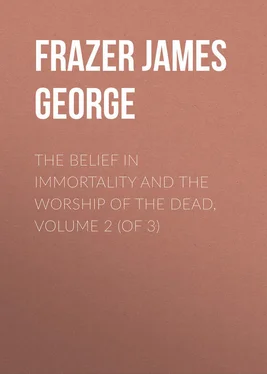James Frazer - The Belief in Immortality and the Worship of the Dead, Volume 2 (of 3)
Здесь есть возможность читать онлайн «James Frazer - The Belief in Immortality and the Worship of the Dead, Volume 2 (of 3)» — ознакомительный отрывок электронной книги совершенно бесплатно, а после прочтения отрывка купить полную версию. В некоторых случаях можно слушать аудио, скачать через торрент в формате fb2 и присутствует краткое содержание. Жанр: foreign_antique, foreign_prose, на английском языке. Описание произведения, (предисловие) а так же отзывы посетителей доступны на портале библиотеки ЛибКат.
- Название:The Belief in Immortality and the Worship of the Dead, Volume 2 (of 3)
- Автор:
- Жанр:
- Год:неизвестен
- ISBN:нет данных
- Рейтинг книги:3 / 5. Голосов: 1
-
Избранное:Добавить в избранное
- Отзывы:
-
Ваша оценка:
- 60
- 1
- 2
- 3
- 4
- 5
The Belief in Immortality and the Worship of the Dead, Volume 2 (of 3): краткое содержание, описание и аннотация
Предлагаем к чтению аннотацию, описание, краткое содержание или предисловие (зависит от того, что написал сам автор книги «The Belief in Immortality and the Worship of the Dead, Volume 2 (of 3)»). Если вы не нашли необходимую информацию о книге — напишите в комментариях, мы постараемся отыскать её.
The Belief in Immortality and the Worship of the Dead, Volume 2 (of 3) — читать онлайн ознакомительный отрывок
Ниже представлен текст книги, разбитый по страницам. Система сохранения места последней прочитанной страницы, позволяет с удобством читать онлайн бесплатно книгу «The Belief in Immortality and the Worship of the Dead, Volume 2 (of 3)», без необходимости каждый раз заново искать на чём Вы остановились. Поставьте закладку, и сможете в любой момент перейти на страницу, на которой закончили чтение.
Интервал:
Закладка:
But in contrast to the temporary taboos which affected common folk and debarred them for a time from familiar intercourse with their fellows, a perpetual and very stringent taboo was laid on the persons and property of chiefs, especially of those high hereditary chiefs who bore the title of Ariki and were thought to be able at any time to hold visible converse with their dead ancestors. 103 103 E. Dieffenbach, Travels in New Zealand , ii. 40, 112 sq. , 356; E. Shortland, Traditions and Superstitions of the New Zealanders , p. 104; R. Taylor, Te Ika A Maui , pp. 149, 164, 212 sq. ; E. Tregear, Maori-Polynesian Comparative Dictionary , pp. 23 sq. , s. v. "Ariki." The word ariki signifies properly the first-born or heir, whether male or female, of a family.
Strictly speaking, "the ariki of a Maori tribe is the senior male descendant of the elder branch of the tribe, that is, he is a descendant of the elder son of the elder son of each generation from the time of the original ancestor down to the present day. As such, he was of old regarded almost as a god, inasmuch as he represented all that there was of măna and sacredness of his tribe. That he should have been regarded in this light is not astonishing, for the Maoris believed he was something more than human, in that he was the shrine of an hereditary Atua , the guardian spirit of the tribe, and could therefore at any time communicate with the tribal gods… Such a man was not only tapu in person but he made everything he touched so dangerously sacred as to be a source of terror to the tribe. To smoke his pipe, or drink from any vessel he had touched, was death speedy and certain at the hands of the gods, who avenge breaches of the tapu ." 104 104 Lieut. – Col. W. E. Gudgeon, "Maori Religion," Journal of the Polynesian Society , vol. xiv. no. 3 (September 1905), p. 130. Compare id. , "The Tipua-Kura and other Manifestations of the Spirit World," Journal of the Polynesian Society , vol. xv. no. 57 (March 1906), p. 38.
"The gods being no more than deceased chiefs, the arikis were regarded as living ones, and thus were not to be killed by inferior men, but only by those who had more powerful atuas in them; the victorious chief who had slain numbers, swallowed their eyes, and drunk their blood, was supposed to have added the spirits of his victims to his own, and thus increased his mana or power; to keep up this idea, and hinder the lower orders from trying whether it were possible to kill such corporeal and living gods, was the grand work of the tapu ." 105 105 R. Taylor, Te Ika a Maui , p. 173. Mana means authority, especially divine authority or supernatural power. See E. Tregear, Maori-Polynesian Comparative Dictionary , p. 203, s. v. "Mana"; and for a full discussion of the conception see Lieut. – Col. W. E. Gudgeon, "Mana Tangata," Journal of the Polynesian Society , vol. xiv. no. 2 (June 1905), pp. 49-66. " Mana plays a leading part in the ability of a leader, or successes in war of celebrated warriors. When a man frequently undertakes daring deeds, which ought under ordinary circumstances to fail, but none the less prove successful, he is said to possess mana , and thereafter is regarded as one peculiarly favoured by the gods, and in such cases it is held that he can only be overcome by some act or default; such as a disregard or neglect of some religious or warlike observance, which has been shown by experience to be essential to success in war, but which our warrior, spoiled by a long career of good fortune, had come to regard as necessary to ordinary mortals only and of but little consequence to men of mana " (W. E. Gudgeon, op. cit. p. 62). "There were cases in which the mana of a man depended upon the facility with which he could communicate with the spirits of departed ancestors, that is, upon his capacity to enforce the aid and attendance of these minor deities. To this end every man with any pretension to mana had a knowledge of certain forms of invocation by which he could summon the spirits of long departed heroes and ancestors, but it must not be supposed that these invocations would necessarily have power in the mouths of all men, for such was not the case. The efficacy of a karakia or invocation depended in part on its method of delivery, and in part on the mana of the man who used it" (W. E. Gudgeon, op. cit. p. 50). Compare R. Taylor, Te Ika A Maui , pp. 172, 173; Old New Zealand , by a Pakeha Maori, p. 100.
The godhead of a chief was thought to reside in his eyes, especially in his left eye; that was why by swallowing the eye or eyes of a slain chief a living chief was believed to absorb the divine spirit of the dead man and thereby to strengthen his own divinity; the more eyes he swallowed, the greater god he became. 106 106 R. Taylor, Te Ika A Maui , pp. 147, 352. The soul was thought to reside especially in the left eye; accordingly it was the left eye of an enemy which was most commonly swallowed by a victorious chief who desired to increase his spiritual power. See J. Dumont d'Urville, Voyage autour du Monde et à la recherche de la Pérouse, Histoire du Voyage (Paris, 1832-1833), ii. 527; E. Dieffenbach, Travels in New Zealand , ii. 118, 128 sq.
Every such divine chief was under a permanent taboo; he was as it were surrounded by an atmosphere of sanctity which attached to his person and never left him; it was his birthright, a part of himself of which he could not be divested, and it was well understood and recognised by everybody at all times. And the sanctity was not confined to his person, it was an infection which extended or was communicated to all his movable property, especially to his clothes, weapons, ornaments, and tools, indeed to everything which he touched. Even the petty chiefs and fighting men, everybody indeed who could claim the title of rangatira or gentleman, possessed in some degree this mysterious quality. 107 107 Old New Zealand , by a Pakeha Maori, p. 94.
However, in young people of rank the sanctity which appertained to them by virtue of their birth was supposed to be only latent; it did not develop or burst into full bloom till they had reached mature age and set up house on their own account. Hence noble boys and lads were under none of the irksome restrictions to which in their adult years they were afterwards bound to submit; they mixed freely with the profane vulgar and did not even disdain to carry fuel or provisions on their backs, a thing which no man of any standing could possibly do; at all events, if he did so demean himself, the food was thereby rendered taboo and could accordingly be used by nobody but himself. "If he went into the shed used as a kitchen (a thing, however, he would never think of doing except on some great emergency), all the pots, ovens, food, etc., would be at once rendered useless – none of the cooks or inferior people could make use of them, or partake of anything which had been cooked in them. He might certainly light a little fire in his own house, not for cooking, as that never by any chance could be done in his house, but for warmth; but that, or any other fire, if he should have blown upon it with his breath in lighting it, became at once tapu , and could be used for no common or culinary purpose. Even to light a pipe at it would subject any inferior person, or in many instances an equal, to a terrible attack of the tapu morbus , besides being a slight or affront to the dignity of the person himself. I have seen two or three young men fairly wearing themselves out on a wet day and with bad apparatus trying to make fire to cook with, by rubbing two sticks together, when on a journey, and at the same time there was a roaring fire close at hand at which several rangatira and myself were warming ourselves, but it was tapu , or sacred fire – one of the rangatira had made it from his own tinder-box, and blown upon it in lighting it, and as there was not another tinder-box amongst us, fast we must, though hungry as sharks, till common culinary fire could be obtained." 108 108 Old New Zealand , by a Pakeha Maori, p. 98.
Интервал:
Закладка:
Похожие книги на «The Belief in Immortality and the Worship of the Dead, Volume 2 (of 3)»
Представляем Вашему вниманию похожие книги на «The Belief in Immortality and the Worship of the Dead, Volume 2 (of 3)» списком для выбора. Мы отобрали схожую по названию и смыслу литературу в надежде предоставить читателям больше вариантов отыскать новые, интересные, ещё непрочитанные произведения.
Обсуждение, отзывы о книге «The Belief in Immortality and the Worship of the Dead, Volume 2 (of 3)» и просто собственные мнения читателей. Оставьте ваши комментарии, напишите, что Вы думаете о произведении, его смысле или главных героях. Укажите что конкретно понравилось, а что нет, и почему Вы так считаете.











